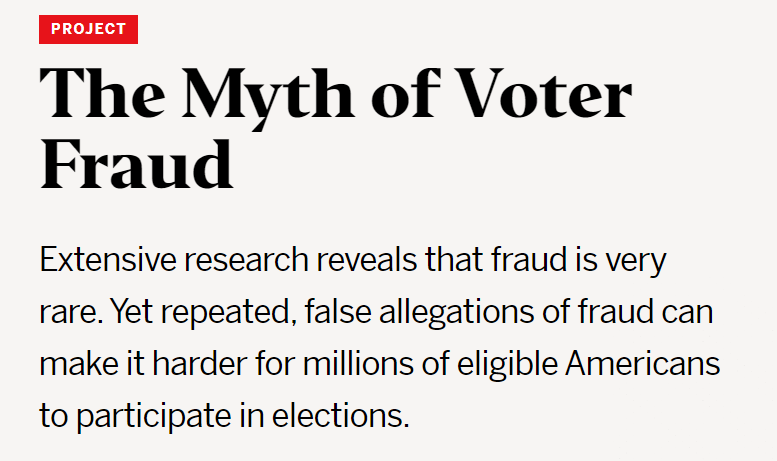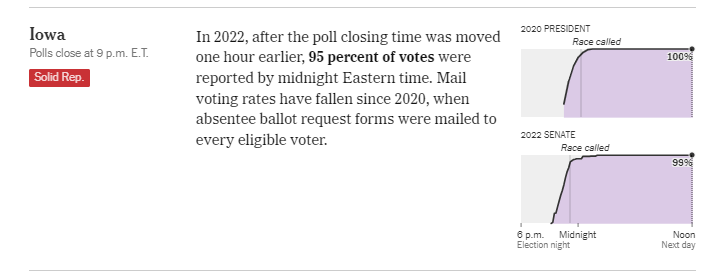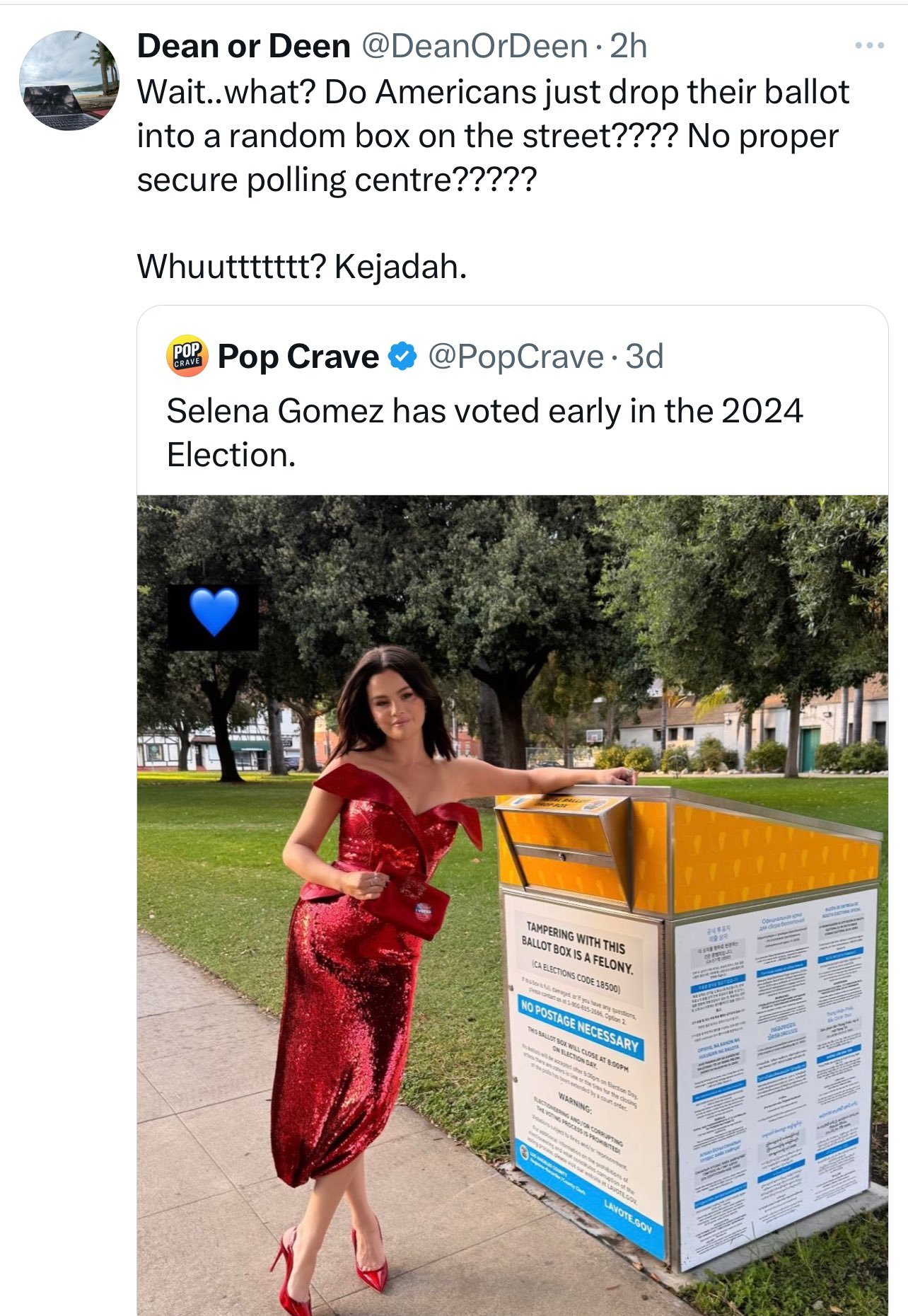It’s time for a U.S. election, which means it’s time for (take a deep breath here): “VOTER FRAUD NEVER EVER HAPPENS!”



The deluge is suffocating, absolute, and unanimous: Voter fraud doesn’t happen. Don’t even worry or think about it.
So it’s comically inconvenient that last week a Chinese student at the University of Michigan cast a ballot in the presidential race, having missed the memo that what he did was supposed to never happen.
Michigan prosecutors charged a Chinese citizen with voter fraud and perjury after he allegedly cast a ballot in the 2024 election, authorities announced Wednesday.
Sources familiar with the matter told CNN that the 19-year-old Chinese man who allegedly voted is a student who lives in Ann Arbor, home to the University of Michigan. Authorities said the man isn’t a US citizen, and therefore can’t vote in federal elections.
The announcement from Michigan’s secretary of state and attorney general, and local prosecutors in Ann Arbor, comes as former President Donald Trump and his Republican allies spread concerns about mass voting by non-citizens. Experts say illegal voting by non-citizens is extremely rare, and when it does happen, it is usually caught quickly.
… The man registered to vote at the polling place on Sunday, the source said. He used his university ID and other documents to demonstrate his residency in Ann Arbor while filling out a same-day voter registration forms, the source said. The Detroit News first reported the details.
… It appears that the student’s vote can’t be nullified after the fact and will be counted.
Defenders of the status quo will claim that the Michigan story is simply a “rare” event. But simply look at the details of the story, and one realizes how paper-thin the defenses are. Everything about the Michigan story drives home the absurdity and vulnerability of America’s election laws. There’s the fact the unknown student was able to clear ID thresholds without ever having to prove citizenship. There is the fact that his illegal vote was only caught because he immediately revealed what he had done. And most glaring of all, there’s the fact that despite being immediately caught several days before the actual vote, his ballot will still count.
Don’t be gaslit. Donald Trump will hopefully still triumph today; the nature of America’s election system is not so broken that beating the system is impossible. But Trump is unnecessarily fighting uphill against a mess of absurd laws, rules, and decisions that are maintained for no reason except that they make it easier to produce useful fraud on the margins.
Taking an Eternity to Count
There’s a reason that slow counting is considered a potential sign of electoral fraud: A longer, more drawn-out process gives bad actors more time to meddle with the system, find weaknesses, and inject fraudulent votes, while a rapid count can leave them with no time to act.
With more machines available than ever, all the tech is there for U.S. vote totals to be tallied up faster than ever. Yet one of the most visible signs of the gradual third-worldization of American elections is that as time passes, the speed at which actual ballots are counted seems to be slowing down.
In Pennsylvania in 2020, only 54% of ballots were counted by midnight on election night. Even by noon of the following day, the tally was at just 82%, and it took 4 whole days for PA to even get far enough for the AP to declare Joe Biden the “winner.” But it could be worse: In California during the 2022 midterms, the state had barely half the vote counted by noon the following day, and it took weeks to finalize the results of close House races. In fact, a full week after the midterms, Los Angeles County alone had more than 500,000 ballots outstanding.
There is absolutely no reason for things to be this way. In Britain, polling stations close at 10 p.m., yet the country has no problem having practically every ballot counted by the following morning—even though ballots are all on paper and are counted by hand. But there’s not even a need to look abroad. In Iowa, state laws require officials to get all votes counted by 10 p.m. local time and be compelled by the force of law; that’s exactly what happens.

But it’s not just a lack of energy to count votes that slows down the system. U.S. states have also made rules that intentionally prolong the process by allowing mail votes to show up days after the election is supposedly “over.” To somebody whose brain is not utterly poisoned by regime propaganda, this is obviously a tremendous invitation to fraudulent behavior: If ballots can show up after the vast majority have been counted, that’s an obvious vulnerability a bad actor could use to swing a close election.
The fix is obvious: require all ballots to arrive by the time polls close on Election Night, and then order them counted as quickly as possible. This is the system used in Florida, and it has worked completely. So, what’s the reason other states don’t adopt the same system?
To ask the question is to answer it.
No Check for Citizenship
Only American citizens are allowed to vote in state or federal elections, which seems like a natural and straightforward rule.
But a law only has merit if there is a means to enforce it. So, what protections are in place to make sure federal elections enforce this rule?
That’s the joke.
The answer, of course, is nothing.
Under existing federal law, it is illegal for any state to require proof of citizenship in order to cast a vote in a federal election. Instead, a voter only has to sign a box saying they are a U.S. citizen.
Specifically, this box:

That’s it! Just sign your name (or your mark, if you can’t write!) and ta-da, you have attested to your citizenship and can vote in any federal election.
Say, did you know this form is offered in Haitian Creole? And Somali? We wouldn’t want any of America’s most vibrant to miss a chance of attesting that they are, to the best of their knowledge, U.S. citizens!
Once a person registers, is anything done to make sure they didn’t perjure themselves regarding their citizenship status? Not really.
Read the press, and they will tell you that non-citizens voting is so rare that it’s not worth worrying about, really, not even worth checking to see if it happens. To support their point, the press has recently pointed to an audit of Georgia’s voter rolls, which found “only” 20 illegal non-citizen voters.
But read the story closer, and something stands out.
The Georgia secretary of state’s office announced in July that it was in the process of checking the voter rolls for noncitizens using state and federal databases. Raffensperger said the 20 people who were conclusively identified as noncitizens lived in seven counties, mostly in metro Atlanta, and had filled out a sworn statement saying they were not citizens to get out of jury duty.
The illegal Georgia voters were only caught because they publicly declared themselves to be non-citizens!
The same thing happened with a recent audit of non-citizen voters in Iowa.
Just under 0.1% of registered voters in Iowa have identified themselves as non-citizens, according to an update Tuesday from Secretary of State Paul Pate.
The information came to light during an audit of 2.3 million Iowa voter records. During that process, Pate’s office identified 2,176 records — or 0.09% of the total — that were problematic:
87 people self-reported after they had voted that they weren’t citizens
67 people self-reported after registering to vote that they weren’t citizens — but they did not vote
2,022 people self-reported they weren’t citizens then voted or registered to vote anyway.
The same situation holds: All of the non-citizens caught in Iowa’s dragnet were caught because they publicly announced their status. So, here’s a thought: What if they hadn’t done that?
Just like with long counting periods, the lunacy of this would be relatively straightforward to fix: Pass a federal law stating that a person can only vote if they can actually prove citizenship status. But the bill to do just that, the SAVE Act, has gone nowhere in Congress. Why? Once again, asking the question leads naturally to the answer.
Unguarded Drop Boxes
Modern life is a frightening panopticon. Even back in 2019, the U.S. already had about 85 million surveillance cameras, about one for every four people. Frontdoor cameras and dashcams have become routine.
So, if it’s worthwhile for your local supermarket to have ten different cameras scanning every aisle so nobody can steal Oreos, surely it’s worthwhile to have a camera on every ballot box so nobody can steal our democracy, right?
Yeah, you know where this is going.
In many of the states that employ ballot drop boxes, including some swing states, there is no requirement to have surveillance of drop boxes. In Wisconsin, “most” boxes have a camera—how reassuring! In New Mexico, officials announced that they had implemented 24/7 monitoring of drop boxes after somebody set hundreds of ballots on fire inside a drop box in Washington state.
Believe it or not, people who aren’t stuck inside America’s propaganda apparatus find this pretty weird!

The Phantom Postmark
An important part of security for mailed-in ballots is the postmark date placed on it by the postal service. At the risk of tediously explaining the obvious, the postmark is how we know a ballot was actually submitted on or prior to Election Day, and it’s also the proof that a mail ballot actually went through the postal system at all and wasn’t, say, slapped together by political operatives after the polls close to try swinging a close race.
So it’s rather revealing that when the votes are counted in Nevada this week, mail ballots don’t require a postmark.
This might surprise Nevada lawmakers, who passed a law explicitly stating that, in order to be counted, a mail ballot must be postmarked on Election Day or earlier. But that law wasn’t nearly clever enough for the judges of Nevada’s Supreme Court. Since the law charitably stated that a mail ballot with a smudged, illegible, or otherwise unreadable postmark would be considered valid, the Supreme Court took the extra step of saying that a ballot with no postmark has a valid postmark. No, really.
Nevada Supreme Court concludes that the word "postmark" means "no postmark." https://t.co/wZJQkBz1tO pic.twitter.com/sLtiURmVuI
— Derek T. Muller (@derektmuller) October 28, 2024
That’s not the only silliness pertaining to late-arriving mail ballots. In California, ballots can arrive up to a full week after an election. Once again, a pre-election night postmark is nominally required but easily evaded: If the voter simply writes a legal date on their envelope themselves, it is presumptively valid. This kind of security is like if a retail store stopped shoplifters, not by checking receipts, but by simply asking a shopper if they’d paid for the goods they are carrying about. It’s exactly as stupid as it sounds.
Mail Voting Is Bullshit No Matter What
Fussing over mail vote arcana, though, may be missing the forest for the trees. Because, ultimately, the problem with mail voting is that mail voting is ridiculous.
The ways that mail-in voting undercuts the basic security of a democratic political system are obvious, in order to discourage intimidation, threats, and bribery. When everyone votes at an actual voting booth in a polling place, the secret ballot is easy. A person holding a mail ballot, meanwhile, can easily be harangued, pressured, threatened, bribed, or even forced to vote a certain way, and the person targeting them will be able to know with absolute certainty whether their efforts were successful.
In-person voting rewards individual agency—a person has to bother to take themselves to a polling place to cast their ballot. With mail voting, the avenue is wide open for children to fill out their parents’ ballots, for wives to fill out their husbands’ ballots, and for harvesters to fill out the ballots of the uninterested.
Every potential abuse of mail voting that you could imagine has, in fact, already happened in America. Nursing home staff “helping” senile nursing home residents cast votes? Already happened in Wisconsin. Mail ballots stolen, filled out, and submitted by someone else? It happened just a few weeks ago in Colorado. Using mail ballots to vote in multiple states? Happens all the time.
It’s unsurprising, then, that mail voting is illegal or sharply restricted in just about every other country. In France, mail voting is illegal outside of fringe cases for citizens living abroad. In fact, even absentee ballots are illegal in France, and voters who cannot make it to a polling place must instead have someone else proxy vote on their behalf. Similar laws prevail in Sweden, Belgium, Mexico, and more. In Italy, even mail voting abroad is banned. In Japan, domestic mail voting requires having a serious mobility-impairing disability. And in Israel, all mail voting is completely illegal, period; no exceptions. The country’s solution for voters who are hospitalized, imprisoned, or otherwise impaired is to literally set up special polling places just for them.
The same norms prevail all over Latin America. From Peru to Honduras to Trinidad to Jamaica to Brazil, mail voting is banned completely, even for residents living abroad.
The rest of the world doesn’t fall for the sham of mail-in voting. Only in America is a browbeaten public expected to accept the legitimacy of an obviously corrupt voting system. At least in Russia, they aren’t expected to think the elections are real.
The corrupt ruling class has raped and plundered the word “democracy” to the degree that it almost feels wrong to use the term in a genuine and non-cynical context. Trump famously and repeatedly points out the obvious truth that a nation that doesn’t have borders is no nation at all. Similarly, we might say that a so-called democracy that does not have true election integrity is not a democracy at all, and that rule by the people, for the people, of the people is a cruel mirage.
Let’s hope that Trump wins despite the absurd disadvantages outlined above and that this election is the very last election in our nation’s history in which our election integrity is just as farcical as our non-existent borders.

Join the Discussion